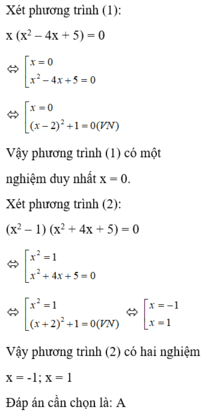CMR:x4-4x+5>0
H24
Những câu hỏi liên quan
Tìm x biết
(6-3x)^2-2(3x-6)=0(2x+5)^3-(2x+5)=0(6-4x)^3-(6-4x)=0(5-4x)^2-(4x+5)=0Bài 1: Giải phương trình và bất phương trình sau: 1. 5.(2-3x). (x-2) = 3.( 1-3x) 2. 4x^2 + 4x + 1= 0 3. 4x^2 - 9= 0 4. 5x^2 - 10=0 5. x^2 - 3x= -2 6. |x-5| - 3= 0
Tìm x
(4x-5)-3x(5-4x)=0
\(\Leftrightarrow\left(3x+1\right)\left(4x-5\right)=0\Leftrightarrow\left[{}\begin{matrix}x=-\dfrac{1}{3}\\x=\dfrac{5}{4}\end{matrix}\right.\)
Đúng 0
Bình luận (0)
giải pt:
a, \(2x^2-6x-1=\sqrt{4x+5}\)
b, \(18x^2+6x-29=\sqrt{12x+61}\)
c, \(4x^2-13x+5+\sqrt{3x+1}=0\)
c, \(4x^2-13x+5+\sqrt{3x+1}=0\)
c.
ĐLXĐ: \(x\ge-\dfrac{1}{3}\)
\(-\left(3x+1\right)+\sqrt{3x+1}+4x^2-10x+6=0\)
Đặt \(\sqrt{3x+1}=t\ge0\)
\(\Rightarrow-t^2+t+4x^2-10x+6=0\)
\(\Delta=1+4\left(4x^2-10x+6\right)=\left(4x-5\right)^2\)
\(\Rightarrow\left[{}\begin{matrix}t=\dfrac{-1+4x-5}{-2}=3-2x\\t=\dfrac{-1-4x+5}{-2}=2x-2\end{matrix}\right.\)
\(\Leftrightarrow\left[{}\begin{matrix}\sqrt{3x+1}=3-2x\left(x\le\dfrac{3}{2}\right)\\\sqrt{3x-1}=2x-2\left(x\ge1\right)\end{matrix}\right.\)
\(\Leftrightarrow\left[{}\begin{matrix}3x+1=4x^2-12x+9\left(x\le\dfrac{3}{2}\right)\\3x-1=4x^2-8x+4\left(x\ge1\right)\end{matrix}\right.\)
\(\Leftrightarrow...\)
Đúng 3
Bình luận (0)
b.
ĐKXĐ: \(x\ge-\dfrac{61}{12}\)
\(\Leftrightarrow36x^2+12x-58-2\sqrt{12x+61}=0\)
\(\Leftrightarrow\left(36x^2+24x+4\right)-\left(12x+61+2\sqrt{12x+61}+1\right)=0\)
\(\Leftrightarrow\left(6x+2\right)^2-\left(\sqrt{12x+61}+1\right)^2=0\)
\(\Leftrightarrow\left(6x+1-\sqrt{12x+61}\right)\left(6x+3+\sqrt{12x+61}\right)=0\)
\(\Leftrightarrow...\) tương tự câu a
Đúng 2
Bình luận (0)
a.
ĐKXĐ: \(x\ge-\dfrac{5}{4}\)
\(\Leftrightarrow4x^2-12x-2-2\sqrt{4x+5}=0\)
\(\Leftrightarrow\left(4x^2-8x+4\right)-\left(4x+5+2\sqrt{4x+5}+1\right)=0\)
\(\Leftrightarrow\left(2x-2\right)^2-\left(\sqrt{4x+5}+1\right)^2=0\)
\(\Leftrightarrow\left(2x-2-\sqrt{4x+5}-1\right)\left(2x-2+\sqrt{4x+5}+1\right)=0\)
\(\Leftrightarrow\left(2x-3-\sqrt{4x+5}\right)\left(2x-1+\sqrt{4x+5}\right)=0\)
\(\Leftrightarrow\left[{}\begin{matrix}\sqrt{4x+5}=2x-3\left(x\ge\dfrac{3}{2}\right)\\\sqrt{4x+5}=1-2x\left(x\le\dfrac{1}{2}\right)\end{matrix}\right.\)
\(\Leftrightarrow\left[{}\begin{matrix}4x+5=4x^2-12x+9\left(x\ge\dfrac{3}{2}\right)\\4x+5=4x^2-4x+1\left(x\le\dfrac{1}{2}\right)\end{matrix}\right.\)
\(\Leftrightarrow...\)
Đúng 2
Bình luận (0)
|2 + 3x| = |4x - 3|
|3/2x + 1/2| = |4x - 1|
|5/4x - 7/2| - |5/8x + 3/5| = 0
|7/5x + 3/2| - |4/3 - 1/4| = 0
\(\left|2+3x\right|=\left|4x-3\right|\)
\(\Leftrightarrow\orbr{\begin{cases}2+3x=4x-3\\2+3x=3-4x\end{cases}}\Leftrightarrow\orbr{\begin{cases}x=5\\x=\frac{1}{7}\end{cases}}\)
Vậy \(x\in\left\{\frac{1}{7};5\right\}\)
\(\left|\frac{3}{2}x+\frac{1}{2}\right|=\left|4x-1\right|\)
\(\Leftrightarrow\orbr{\begin{cases}\frac{3}{2}x+\frac{1}{2}=4x-1\\\frac{3}{2}x+\frac{1}{2}=1-4x\end{cases}}\Leftrightarrow\orbr{\begin{cases}x=\frac{3}{5}\\x=\frac{1}{11}\end{cases}}\)
Vậy \(x\in\left\{\frac{1}{11};\frac{3}{5}\right\}\)
Đúng 0
Bình luận (0)
\(\left|\frac{5}{4}x-\frac{7}{2}\right|-\left|\frac{5}{8}x+\frac{3}{5}\right|=0\)
\(\Leftrightarrow\left|\frac{5}{4}x-\frac{7}{2}\right|=\left|\frac{5}{8}x+\frac{3}{5}\right|\)
Giải tiếp tương tự
Sau đó giải tiếp câu còn lại
Đúng 0
Bình luận (0)
a, \(\left|2+3x\right|=\left|4x-3\right|\)
\(\Rightarrow\orbr{\begin{cases}2+3x=4x-3\\2+3x=-4x+3\end{cases}\Rightarrow\orbr{\begin{cases}3x-4x=-3-2\\3x+4x=3-2\end{cases}\Rightarrow}\orbr{\begin{cases}-x=-5\\7x=1\end{cases}\Rightarrow\orbr{\begin{cases}x=5\\x=\frac{1}{7}\end{cases}}}}\)
Câu b tương tự
c, \(\left|\frac{5}{4}x-\frac{7}{2}\right|-\left|\frac{5}{8}x+\frac{3}{5}\right|=0\)
\(\Rightarrow\left|\frac{5}{4}x-\frac{7}{2}\right|=\left|\frac{5}{8}x+\frac{3}{5}\right|\)
\(\Rightarrow\orbr{\begin{cases}\frac{5}{4}x-\frac{7}{2}=\frac{5}{8}x+\frac{3}{5}\\\frac{5}{4}x-\frac{7}{2}=-\frac{5}{8}x-\frac{3}{5}\end{cases}\Rightarrow\orbr{\begin{cases}\frac{5}{4}x-\frac{5}{8}x=\frac{3}{5}+\frac{7}{2}\\\frac{5}{4}x+\frac{5}{8}x=-\frac{3}{5}+\frac{7}{2}\end{cases}\Rightarrow}\orbr{\begin{cases}\frac{5}{8}x=\frac{41}{10}\\\frac{15}{8}x=\frac{29}{10}\end{cases}\Rightarrow}\orbr{\begin{cases}x=\frac{164}{25}\\x=\frac{116}{75}\end{cases}}}\)
d, \(\left|\frac{7}{5}x+\frac{3}{2}\right|-\left|\frac{4}{3}-\frac{1}{4}\right|=0\)
\(\Rightarrow\left|\frac{7}{5}x+\frac{3}{2}\right|-\frac{13}{12}=0\)
\(\Rightarrow\left|\frac{7}{5}x+\frac{3}{2}\right|=\frac{13}{12}\)
Đến đây dễ rồi, tự làm tiếp :)
P/s: Ko chắc, sai ib với t :v
Đúng 0
Bình luận (0)
Xem thêm câu trả lời
Giải các phương trình tích sau: Mng giúp em với ạ.
a) (3x – 2)(4x + 5) = 0 b) (2,3x – 6,9)(0,1x + 2) = 0
c) 2x(x – 3) + 5(x – 3) = 0 d) (3x – 1)(x2 + 2) = (3x – 1)(7x – 10)
e) (x + 2)(3 – 4x) = x2 + 4x + 4 f) x(2x – 7) – 4x + 14 = 0
g) (2x – 5)2 – (x + 2)2 = 0 h) (x2 – 2x + 1) – 4 = 0
i) 3x2 + 2x – 1 = 0 k) x2 – 5x + 6 = 0
l) x2 – 3x + 2 = 0 m) 2x2 – 6x + 1 = -3
a: (3x-2)(4x+5)=0
=>3x-2=0 hoặc 4x+5=0
=>x=2/3 hoặc x=-5/4
b: (2,3x-6,9)(0,1x+2)=0
=>2,3x-6,9=0 hoặc 0,1x+2=0
=>x=3 hoặc x=-20
c: =>(x-3)(2x+5)=0
=>x-3=0 hoặc 2x+5=0
=>x=3 hoặc x=-5/2
Đúng 0
Bình luận (0)
Cho phương trình (1): x(
x
2
– 4x + 5) 0 và phương trình (2): (
x
2
– 1)(
x
2
+ 4x + 5) 0.Chọn khẳng định đúng A. Phương trình (1) có một nghiệm, phương trình (2) có hai nghiệm B. Phương trình (1) có hai nghiệm, phương trình (2) có một nghiệm C. Hai phương trình đều có hai nghiệm D. Hai phương trình đều vô nghiệm
Đọc tiếp
Cho phương trình (1): x( x 2 – 4x + 5) = 0 và phương trình (2): ( x 2 – 1)( x 2 + 4x + 5) = 0.
Chọn khẳng định đúng
A. Phương trình (1) có một nghiệm, phương trình (2) có hai nghiệm
B. Phương trình (1) có hai nghiệm, phương trình (2) có một nghiệm
C. Hai phương trình đều có hai nghiệm
D. Hai phương trình đều vô nghiệm
chứng minh rằng với mọi x ϵ R
x^2-8x+17>0
x^2+4x+5>0
x^2-x+1>0
-x^2-4x-5<0
-x^2-3x-4<0
-x^2+10x-27<0
(4x - 7)\(^2\) - 5 . |7 - 4x| = 0
\(\Leftrightarrow\left|4x-7\right|\left(\left|4x-7\right|-5\right)=0\\ \Leftrightarrow\left[{}\begin{matrix}\left|4x-7\right|=0\\\left|4x-7\right|=5\end{matrix}\right.\Leftrightarrow\left[{}\begin{matrix}4x-7=0\\4x-7=5\\7-4x=5\end{matrix}\right.\Leftrightarrow\left[{}\begin{matrix}x=\dfrac{7}{4}\\x=3\\x=\dfrac{1}{2}\end{matrix}\right.\)
Đúng 3
Bình luận (0)
a. 4x-3=0
b. -x+2=6
c. -5+4x=10
d. 4x-5=6
h. 1-2x=3
2.a
(x-2).(4+3x)=0
b) (4x-1).3x=0
c) (x-5).(1+2x)=0
d) 3x.(x+2)=0
3)giẳi pt và biu diễn trục số
a) 3(x-4)-2(x-1)≥0
b) 3-2(2x+3)≤9x-4
c) 5-2(1-3x)≥-2x+4
d) 9-3(x-1)≥4x-5
Bài 1. a) 4x - 3 = 0
⇔ x = \(\dfrac{3}{4}\)
KL.....
b) - x + 2 = 6
⇔ x = - 4
KL...
c) -5 + 4x = 10
⇔ 4x = 15
⇔ x = \(\dfrac{15}{4}\)
KL....
d) 4x - 5 = 6
⇔ 4x = 11
⇔ x = \(\dfrac{11}{4}\)
KL....
h) 1 - 2x = 3
⇔ -2x = 2
⇔ x = -1
KL...
Bài 2. a) ( x - 2)( 4 + 3x ) = 0
⇔ x = 2 hoặc x = \(\dfrac{-4}{3}\)
KL......
b) ( 4x - 1)3x = 0
⇔ x = 0 hoặc x = \(\dfrac{1}{4}\)
KL.....
c) ( x - 5)( 1 + 2x) = 0
⇔ x = 5 hoặc x = \(\dfrac{-1}{2}\)
KL.....
d) 3x( x + 2) = 0
⇔ x = 0 hoặc x = -2
KL.....
Đúng 0
Bình luận (0)
Bài 3.a) 3( x - 4) - 2( x - 1) ≥ 0
⇔ x - 10 ≥ 0
⇔ x ≥ 10
b) 3 - 2( 2x + 3) ≤ 9x - 4
⇔ - 4x - 3 ≤ 9x - 4
⇔ 13x ≥1
⇔ x ≥ \(\dfrac{1}{13}\)
Đúng 0
Bình luận (0)




